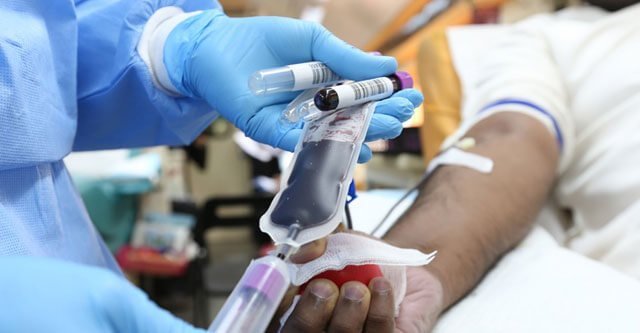Last Updated on June 6, 2021 by Dr Sharon Baisil MD
In today’s world, diabetes is an ever-growing health condition. It has affected almost half of the adult population of America and people in high percentages in regions worldwide.
This is a condition of the body’s blood sugar levels that have a very important function in any individual’s overall functioning. If this is a condition that impacts the blood in the body, is it safe to be a blood donor?
Well, blood donation is a good deed of extensive importance. But with the rising number of people on the diabetic health lines, can they be blood donors and participate in contributing to other’s health?
Today, let us discuss the various complications, rules, and restrictions when donating blood to diabetics. We will have a look at …
- Why can’t type 1 diabetic donate blood?
- Can you donate blood if you have type 2 diabetes?
- Can donating blood lower your A1C?
- Why can’t type 2 diabetics donate plasma?
And many more such informative questions.
These are not just questions to be answered to ensure that you are healthy but also revolve around the safety of other patients to who you might be meaning to donate blood. Hence, it is crucial to be aware of these answers according to your conditions.
So, let us begin by looking into the answers already.
Why can’t type 1 diabetic donate blood?

Well, as a type 1 diabetic, you might have heard that it is not safe to be donating blood. Several reasons surround this advice. Most of it is because it may be harmful to your health.
To understand why as a type 1 diabetic patient, you should not donate blood, let us first have a clear picture of how type 1 diabetes is.
In type 1 diabetes, the pancreas stops producing beta cells connected to the direct supplying of the insulin hormone. Insulin is a metabolic hormone that controls the blood sugar levels in the body.
As a Type 1 diabetes individual, your immune system damages these beta cells that help produce insulin. Thus, your body has either a lack of a deficiency of the insulin hormone.
Therefore, insulin therapy and artificial insulin injections are utilized and delivered to the body to continue the body processes. This is a major reason why Type 1 diabetic patients are recommended not to donate blood.
Type 1 diabetes patients are more prone to be dependent on insulin. Be it the insulin pump therapy you take or the regular insulin injections, you should not donate blood.
Patients taking insulin should not give blood because it can hurt their health and lead to unmanaged blood sugar levels.
Type 1 diabetes patients seem to observe high blood sugar levels up to a few days after having donated blood. The blood glucose levels in Type 1 diabetic patients tend to be affected due to blood donation.
It can impact their insulin management and lead to severe complications. The symptoms of Type 1 diabetes can spike up.
Depending on where you live, your rules on donating blood as a diabetic patient also differ. Doctors also say that blood donating as a Type 1 diabetes patient is safe if all your health conditions are under control.
It is best to consult your doctors and present all information before the doctors about your diabetic conditions before donating blood.
Let us have a look at other details and information as well.
Can you donate blood if you Type 2 diabetes?

Well, precautions come first when it comes to donating blood for any diabetes you might be having. Diabetes is a metabolic disorder directly intertwined with the blood and its levels in the body. Thus, it can become a problem for the overall health and maintenance of your blood sugar levels.
But it is still said that type 2 diabetics can donate blood only if they have stable health conditions and all normal blood sugar levels at the time. There are ranges that your blood sugars have to align with.
However, patients with Type 2 diabetes, who are insulin-dependent, do not classify as healthy for donating blood. It is quite similar to what the rules for Type 1 diabetics are.
In most countries, donating blood as a Type 2 diabetes patient is allowed. It is only observed and kept in mind that the person’s health is fit enough for donating blood and would not lead to any discomfort to the patients on the receiving ends.
However, in the UK, donating blood by anyone on a potential health risk is prohibited, including Diabetes type 1 and type 2 patients.
If you do not have any diabetic symptoms like unstable pressures, cardiovascular, eye, skin, diabetic neuropathy, blood, etc., and related issues, then you can easily donate blood.
Doctors and health specialists say that donating blood as a diabetic patient is okay if you are not experiencing any trouble or high blood sugar levels.
With all the precautions and restrictions in mind, you are safe to be a blood donor even if you have diabetes.
Can donating blood lower your A1C?

Keeping the A1C levels in margins is crucial to judge your overall diabetic performance and record your everyday blood sugar management. But does donating blood affect it in any way?
Well, it is noted that after donating blood, your A1C may have falsely lowered values. It is nothing to worry about as it not a perfect observation and is affected only temporarily.
Although your A1C levels may look low, it is out of danger. You would be under no health risks and can carry on with your diabetes management regularly.
Your A1C records are lower because after donating blood, the blood loss is immediately refilled by the body. This brings in the cell turnover giving rise to new Red Blood Cells in the body.
With newer cells in the blood, these have an unaffected record. Thus, these non-glycosylated cells color the overall A1C reports.
Over time, these new cells will eventually get glycosylated, and your A1C will again show up as normal like it used to be.
You can even talk to doctors about your donation and A1C levels for more safety in these lines. They will be able to carry out respective tests to ensure that everything is okay. Moreover, they may even have other advice that is specific to your diabetic health conditions.
Why can’t Type 2 Diabetics donate plasma?

Type 2 diabetic patients are advised against donating blood plasma as it has different needs varying from blood donations.
The plasma component carries elements other than the blood cells. It includes the nutrient components in blood like – sugars, proteins, fat, and water.
Thus, it depends on one’s well-being to be a plasma donor to someone.
As diabetic patients, you must be diagnosed with unhealthy or insufficient levels of these plasma nutrients. The levels of sugar in the blood that are unstable are the most important factors when it comes to donating plasma as a diabetic patient.
Hence, it is best for diabetic patients not to donate plasma as they have irregular levels of plasma components. To avoid any potential risks to the body and the receiver, experts advise it to refrain from donating plasma.
The difference in Type 2 diabetic patients is that they have unstable and usually high blood sugar levels. This is the primary reason why diabetics, especially Type 2 diabetics, are unfit for donating plasma.
In addition to this, the other nutrients level in the blood plasma is also comparatively unstable when it comes to Type 2 diabetes patients.
It is also advised against plasma donation for Type 2 diabetics as they might later suffer negative health consequences. The release of helpful nutrients may lead to deficiencies or unmatched amounts of blood glucose in the body.
These unregulated levels can also lead to discomforts in the body. You can also experience conditions such as – dehydration, fatigue, infections, weakness, etc.
So to avoid these risks, make sure you stay clear from donating blood plasma. It is best to put your health first and manage your diabetic levels to ensure safety from all sides.
What are the requirements for donating blood as a diabetic patient?

Like any other individual, the conditions for blood donation as a diabetic patient are also quite similar.
One important difference that we have been focusing on until now is that your blood sugar levels must be normal. Around blood donation, you must have the blood sugar under control and aligned with the margins that are specified for type 1 and type 2 diabetes patients accordingly.
Other than that, the regular conditions are:
- You must be over 17 years old to be donating blood.
- Do not donate blood if you have been through recent surgeries.
- Have light recommended snacks and drink a lot of water before donating blood.
- Do not resort to caffeine or alcohol on the day of blood donation.
- Also, carry a specified list of medicines you are currently using to verify your eligibility for blood donation.
- Make sure to get good amounts of rest and sleep the previous night.
- Resort to having light snacks after donating blood as well to prevent fatigue and lightheadedness.
References
- https://academic.oup.com/clinchem/article/51/7/1201/5630040?login=true
- https://journals.plos.org/plosone/article?id=10.1371/journal.pone.0170802
- https://heart.bmj.com/content/78/2/188.short
- https://onlinelibrary.wiley.com/doi/abs/10.1111/j.1423-0410.2009.01275.x
- https://onlinelibrary.wiley.com/doi/abs/10.1111/j.1365-3148.2011.01080.x
- https://www.ncbi.nlm.nih.gov/pmc/articles/PMC3934276/
- https://onlinelibrary.wiley.com/doi/abs/10.1046/j.1537-2995.2002.00120.x
- https://onlinelibrary.wiley.com/doi/abs/10.1046/j.1537-2995.2001.41010123.x
- https://academic.oup.com/aje/article/148/5/445/76921?login=true





